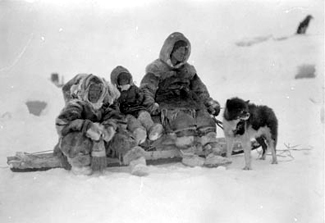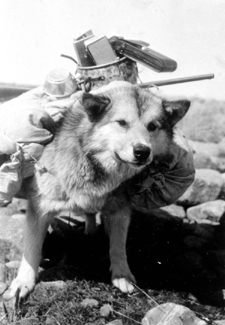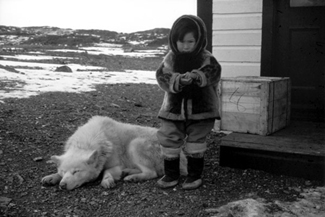In This Issue....
From
the
Editor: Good Deeds, Great and Small
Fan MailIn the News
Sledge Dog Memorial Fund Update
BAS Vignette: Sledging with Dogs
CAAT Northern Project 2008 Plans
Navigating This
Site
Index of articles by subject
Index
of back issues by volume number
Search The
Fan Hitch
Articles
to download and print
Ordering
Ken MacRury's Thesis
Our
comprehensive list of resources
Talk
to The
Fan Hitch
The Fan
Hitch home page
ISDI
home page
Editor's/Publisher's Statement
Editor: Sue Hamilton
Webmaster: Mark Hamilton
The
Fan Hitch, Journal of the Inuit Sled
Dog, is published four times a year. It is
available at no cost online at:
https://thefanhitch.org.
The Fan Hitch welcomes your letters, stories, comments and suggestions. The editorial staff reserves the right to edit submissions used for publication.
Contents of The Fan Hitch are protected by international copyright laws. No photo, drawing or text may be reproduced in any form without written consent. Webmasters please note: written consent is necessary before linking this site to yours! Please forward requests to Sue Hamilton, 55 Town Line Rd., Harwinton, Connecticut 06791, USA or mail@thefanhitch.org.
This site is dedicated to the Inuit Dog as well as related Inuit culture and traditions. It is also home to The Fan Hitch, Journal of the Inuit Sled Dog.
The Fan Hitch welcomes your letters, stories, comments and suggestions. The editorial staff reserves the right to edit submissions used for publication.
Contents of The Fan Hitch are protected by international copyright laws. No photo, drawing or text may be reproduced in any form without written consent. Webmasters please note: written consent is necessary before linking this site to yours! Please forward requests to Sue Hamilton, 55 Town Line Rd., Harwinton, Connecticut 06791, USA or mail@thefanhitch.org.
This site is dedicated to the Inuit Dog as well as related Inuit culture and traditions. It is also home to The Fan Hitch, Journal of the Inuit Sled Dog.

Native family on trail, one dog only, Baker Lake, N.W.T, 1926.
Photo: L.T. Burwash / Canada. Dept. of Indian Affairs and
Northern Development collection / Library and
Archives Canada / PA-099425
The Qikiqtani Inuit Association
Soon to Embark on
Truth Commission Hearings
Truth Commission Hearings
In the latter part of this year, the Qikiqtani Inuit Association (QIA) established the Qikiqtani Truth Commission, the purpose and description of which are outlined below in the QIA's "Terms of Reference" and two recent press releases. A seven-page document, "Rules of Procedure", explains in detail "how the Commission will function and how interested individuals can participate during the inquiry process." The "Rules of Procedure" will be accessible on the yet-to-be-established Qikiqtani Truth Commission web site. Until that time, requests for copies of the "Rules of Procedure" and questions about the Truth Commission's work should be directed to:
| Madeleine Redfern Executive Director Qikiqtani Truth Commission P.O. Box 1340 Iqaluit, NU X0A 0H0 CANADA Tel: (867) 975-8400 or 1-800-667-2742 Email: mredfern@qia.ca |
Makivik is going ahead with their own Commission and focusing solely on the issue of dog slaughter."
About the Qikiqtani Inuit Association
According to their web site, the Qikiqtani Inuit Association "is aimed at representing the interests of the Inuit of the Baffin Region, High Arctic and Belcher Islands in a fair and democratic way.
QIA was formed as a non-profit land claim and community organization in 1996 and registered as a society in 1997. Its predecessor, Baffin Regional Inuit Association (BRIA), was formed in 1975 and registered as a society in 1977.
QIA is one of the three Inuit organizations affiliated with the Nunavut Tunngavik Incorporated (NTI). The Board of Directors of NTI is drawn from three Regional Inuit Associations accountable to Inuit Beneficiaries. QIA does not take the roles of the federal or territorial government, but works with them and other partners to ensure that Inuit are being adequately served by these governments."

Dog carrying gear, Larsen Expedition, ca.1940-1944.
Photographer unknown, Library and
Archives Canada / PA-121395
QIKIQTANI TRUTH COMMISSION
TERMS OF REFERENCE
October 2007
TERMS OF REFERENCE
October 2007
Mandate
The Qikiqtani Inuit Association, hereby directs that a Truth Commission, to be known as the "Qikiqtani Truth Commission", be created to conduct an inquiry to investigate facts, interview witnesses, hold public hearings and to report to the members of QIA and to the public, the truth surrounding the "Dog Slaughter", "Relocations" and other decision-making of the Government up until 1980, and its effect on Inuit culture, economy and way of life.
The Qikiqtani Truth Commission' main objective is to ensure an accurate history of the events referred to above. The truth and reconciliation process seeks to promote healing for those who suffered wrongdoings, as well as to heal relations between Inuit and the Government by providing an opportunity for uncovering all pertinent facts and allowing for acknowledgement and forgiveness. The Qikiqtani Truth Commission cannot provide compensation but will provide recommendations that will promote reconciliation.
The Qikiqtani Truth Commission will not investigate matters relating to the "high arctic relocations" and "residential schools" or other matters that have been or are subject to other processes, including judicial or quasi-judicial processes.
Name
The inquiry shall operate under the name of "Qikiqtani Truth Commission".
Independence
The Qikiqtani Truth Commission shall operate independently and free from any interference from the Qikiqtani Inuit Association.
Amnesty from Civil Suit
The Qikiqtani Inuit Association shall grant amnesty from civil suit to individuals who request it and make full disclosure of all the relevant facts, as decided by the Commissioner of the Qikiqtani Truth Commission, relating to acts associated with the mandate of the Qikiqtani Truth Commission.
Commissioner
The Qikiqtani Inuit Association further directs that James Igloliorte be appointed as Commissioner of the Qikiqtani Truth Commission.
Process
The Commissioner is authorized to adopt any procedures and methods that he may consider expedient for the proper conduct of the Qikiqtani Truth Commission.
The Commissioner may receive any evidence or information which he considers to be helpful in fulfilling his mandate, whether or not such evidence or information would be admissible in court.
Hearings
The Commissioner is authorized to sit at any times and in any places in or outside Nunavut that he may decide is appropriate.
Hearings of the Qikiqtani Truth Commission shall be public, except when warranted by exceptional circumstances, the Commissioner, at his sole discretion, may hold private hearings and shall decide who may attend them.
Standing
The Commissioner is authorized to grant to any person who satisfies him that he or she has a substantial and direct interest in the subject-matter of the Qikiqtani Truth Commission an opportunity for appropriate participation in the Qikiqtani Truth Commission, including but not limited to Government officials and/or agents, in particular, past or present members of the Royal Mounted Police of Canada.
Languages of Operation
The Qikiqtani Truth Commission shall operate in Inuktitut and English.
Administrative Matters
The Commissioner is authorized to spend monies related to the Qikiqtani Truth Commission’s mandate, including but not limited to travel, hearings, translations, interpretation, research, etc.
The Commissioner is authorized to rent any space and facilities that may be required for the purposes of the Qikiqtani Truth Commission.
The Commissioner is authorized to engage the services of staff and experts required to fulfill the mandate of the Qikiqtani Truth Commission.
The Qikiqtani Truth Commission shall conduct its business in accordance to the Qikiqtani Inuit Association financial policies and shall provide regular financial reports to the Qikiqtani Inuit Association.
Records
The Commissioner shall provide the papers and records of the Qikiqtani Truth Commission to the Qikiqtani Inuit Association as soon as reasonably possible after the conclusion of the Qikiqtani Truth Commission.
Report
The Commissioner shall submit a final written report or reports no later than March 31, 2010, simultaneously in Inuktitut and English to the Qikiqtani Inuit Association Board of Directors and then to the public.

Inuit Child and Dog, Fort Ross, N.W.T., 1945.
Photo: Arthur H. Tweedle / Library and
Archives Canada / PA-184765
Qikiqtani Truth Commission
Announces Proposed Schedule for
Community Visits for Commission’s Hearings
Community Visits for Commission’s Hearings
(November 14th, 2007 – Iqaluit, Nunavut) The Qikiqtani Truth Commissioner's schedule for the community visits for the public hearings are set. The Commissioner will visit all thirteen Baffin communities next year. The Commissioner's first visit is Kimmirut at the end of January.
The Qikiqtani Truth Commission was created to conduct an inquiry to investigate facts, hold public hearings, interview witnesses, and to report to the members of QIA and to the public, the truth surrounding the "Dog Slaughter", "Relocations" and other decision- making of the Government until 1980, and its effect on Inuit culture, economy and way of life.
The Commission's main objective is to ensure an accurate history of events. The Commission cannot provide compensation but will provide recommendations that will promote reconciliation.
Public hearings are one of core activities of the Commission and will provide people an opportunity to tell their story directly to the Commissioner.
"Community members have been asking for this for a long time. I'm happy to announce that I will be traveling to all the communities in the Qikiqtani Region. I invite members of the public who wish to come before me to contact my office or their Community Liaison Officer" said Commissioner James Igloliorte.
| Date: 2008 | Community |
| January 21st -25th | Kimmirut : 3 full hearing days |
| January 28th – Feb 1st | Cape Dorset: 3 full hearing days |
| March 3rd – 7th | Sanikiluaq: 3 full hearing days |
| April 12th – 25th | Resolute Bay: 3
full hearing days Grise Ford: 1 ˝ hearing days Arctic Bay: 3 – 4 hearing days |
| May 12th – 23rd | Pangnirtung: 3 –
3 ˝ hearing days Qikiqtarjuaq: 4 full hearing days |
| June 16th – 20th | Iqaluit : 4 – 5 hearing days |
| July | None |
| August | None |
| September 8th – 19th | Igloolik :
4 full hearing days Hall Beach: 2 full hearing days |
| October 6th – 15th | Clyde River: 3 –
3 ˝ hearing days Pond Inlet: 4 – 4 ˝ hearing days |
| November | Full month can be used to re-do and do any missed community |
| December | First two weeks can be used to re-do or do any missed community |
Joanasie Akumalik Joins Qikiqtani Truth Commission
(November 14th, 2007 – Iqaluit, Nunavut) Qikiqtani Truth Commission is happy to announce the arrival of Joanasie Akumalik as Executive Assistant. Joanasie is originally from Arctic Bay. He is married with five children.
Joanasie will play a very important role in assisting the Commission to liaise with the communities, in particular the Community Liaison Officers, the Qikiqtani Inuit Association community representatives, the Hamlet Mayors, Members of Legislative Assembly, and other community groups, in preparation of the Commissioner's arrival into the community.
Joanasie has a vast array of professional experience, everything from wildlife management, mining, education, social, cultural and economic development issues. He has held a variety of leadership positions within various Inuit organizations, Institutions of Public Government and Government, including past Mayor of Arctic Bay. Recently, Joanasie was NTI’s Director of Government and public relations responsible for liaising with politicians and senior bureaucrats. The Qikiqtani Truth Commission believes this experience and knowledge both at the community level and governance institutions will greatly assist the Commission in fulfilling its mandate.
Commissioner James Igloliorte says "we are extremely fortunate to have Joanasie join the Commission. He knows all the Qikiqtani communities, and many of the community members – and they know him. Joanasie’s main role is to help community members understand our objective, know when the Commission is coming to their community, help explain how the public hearings will happen, and most importantly to help build trust and confidence about our work and outcomes."